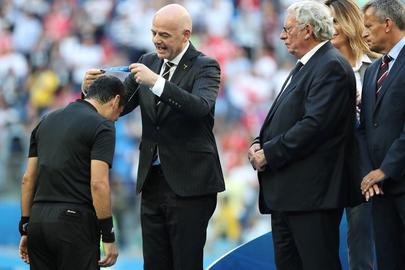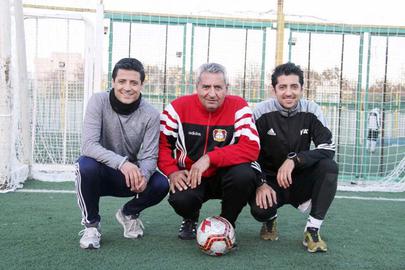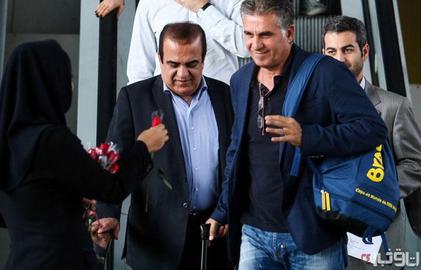Alireza Faghani has a secure place in the history of Iranian football. He, along with two other Iranian referees — Reza Sokhandan and Mohammad Reza Mansouri — officiated some of the most important games of the 2018 FIFA World Cup Games in Russia, including the third-place playoff between England and Belgium. Faghani has worked with FIFA since 2008 and has a distinguished record. He refereed the finals for the 2014 AFC Champions League, the 2015 AFC Asian Cup, the 2015 Club World Cup and the 2016 Olympics. He was also a fourth official at the 2014 World Cup in Brazil.
But when photographs were published of him shaking hands with a female colleague at the World Cup, Faghani faced harassment from the Iranian Football Federation. Officials demanded an explanation for why he ignored the Islamic ban on touching a woman not related to him. In response, Faghani threatened to leave Iran forever if the harassment continued.
IranWire talked to Faghani about his career, his treatment by Iran’s football federation over the years, and the scandal.
Before the World Cup, media coverage and your previous statements — as well as your solid reputation as a referee — suggested you or one of your fellow Iranian referees would probably officiate the final game in the tournament. In the end, you refereed three important games at the group and knockout stages and then the third-place playoff. What was the experience like? Were your expectations, and those of Iranian World Cup referees Reza Sokhandan and Mohammad Reza Mansouri, realized?
Perhaps it is best to say that the World Cup final was our “goal”. In Russia, everything went the way we [the team of Iranian referees] had planned. We got better after each game, and [as the tournament progressed from] the group stage to the knockout stage. But, well, when I look back, I realize that it was we who did well for 50 percent of it. The other 50 percent was up to the decision-making group that gave us the playoff. All in all, perhaps we did not reach our goal, but I see it this way: From among all the referees who were present at the World Cup, we stood on the pedestal and received our award from FIFA. In short, we were seen.
Before the World Cup I came across an interview with you where you said: “If I can officiate the World Cup final, I will bid refereeship farewell.” So the good news is that you did not blow your whistle at the final, so we will see you again at the Iranian League, the Asian League, the approaching AFC Asian Cup or, perhaps, even the next World Cup.
I was not complaining. I believe that in all areas of life you need motivation. You must strive to get where you have not yet reached. I have been a referee at the highest levels of international football, from the Olympics finals and Asian Cup to the FIFA Club World Cup, FIFA Confederations Cup and the most important games of the Iranian League. If we did get to the World Cup final then there would have been no motivation left to continue my refereeing. Of course, for me, stopping being a referee would be like dying but, as I said, motivation is important as well.
But then what made you think that you might want to leave? You once said: “whatever our referees achieved, they achieved it through their own efforts.” This gives a sense of being alone, of an absolute loneliness. Perhaps that feeling was telling you that you should leave after the most important referee job of your life.
As a referee, I have my own philosophy. It is not important to me who thinks what about me. It is not important whether they are happy with me or not. In every game that I refereed, my own satisfaction came first and the satisfaction of those who were supervising me came after that. I have tried not to have a mindset that cares whether somebody likes my work or hates it.
The set of games that FIFA gave you were amazing. They gave you the most important games at the group stage and then the most high-profile game at the knockout stage between France and Argentina. Did you and your team expect it? Did FIFA give you any indication that you would officiate these key games?
When I arrived in Russia I had no expectations. It made no difference to me what game I refereed. On the very first day we agreed that, for us, any game would be like the final. In general, there is a tradition when it comes to choosing referees: Nobody tells you anything about specific games beforehand. Everybody participates in group practices and then, when everybody is present, they give you your assignments.
The selection of the first game depends on your physical readiness and your record as a referee. What happened was that when the first game was over they trusted us again and assigned us to a sensitive game. But there was no indication beforehand. The referees do not know what games they are going to get until 48 hours or, sometimes 24 hours, before the game.
There’s a photograph of you at the third-place match. It shows you whistling to announce the end of the game, and pointing the index finger of your right hand toward the sky. You did the same thing when you were going up the pedestal to receive you medal and the prize, when you were posing for photos with fans, or when you left the pitch after a match. What’s the significance of this gesture?
I come from the southernmost point of Tehran, from dusty football fields with no netting on the goals. In those days when I told somebody that someday I would referee the final of the World Cup the only responses that I got were ridicule and sneers. But this was my goal. I tried hard for it and I believe that God’s kindness played its part, too.
We see young Iranians complain about conditions [in Iran]. They complain about the social and economic situation and deprivation that we know exist. I have always come across these grievances and the only thing that I have to say is this: Stand up by your own bootstraps and do not expect anything from anybody except yourself and your god. I did what I did for these young people. And I believe it was positive.
I have this picture of Alireza Afghani in my mind. A man who was twice suspended from Iran’s Upper League and brutally criticized. He was not even given a chance to defend himself. He was blamed for technical problems with the stadium and suspended. Now this same referee has officiated at the best and the most important international games. What caused this deep divide in trust and respect?
Well, such bans are usual in Iran. And it was not only twice. But the two times that you mentioned got attention. They wanted to use me as a shield. They wanted to say that in those days all the problems in football originated with me. But it was not important. We are used to it and we learn to be patient. And when you learn to be so patient, other obstacles lose their importance. My motivation became stronger every time that I was suspended from Iran’s League. I told myself: “learn, learn your lesson so that it will not become worse.” I became more attentive and more accurate.
Part of the suspensions, as I said, were because they wanted to hide behind me. But we have to accept that, for a referee, a tournament is really different from a league. In a tournament like the World Cup you have one chance in four to officiate a game. Many referees who had come to Russia were finished after the first game. They refereed and returned home. We would be in a different situation if we finished with the World Cup after one or two games. Instead of so much praise and so many compliments, we would have been ridiculed and insulted. But neither do the insults make my determination weaker nor does such praise make me full of myself. I have learned to always be myself.
So what do you say about the photographs of you with the woman who is both a colleague and your friend’s wife?
I believe that in this World Cup so many good things happened both for myself and for my country that I can ignore this. It is not important what is written or said about this. I refereed and made people of my country happy. Now I don’t care who wants to destroy that sense of joy with a few pictures. I am not going to fan their fire. Period.
visit the accountability section
In this section of Iran Wire, you can contact the officials and launch your campaign for various problems


























comments